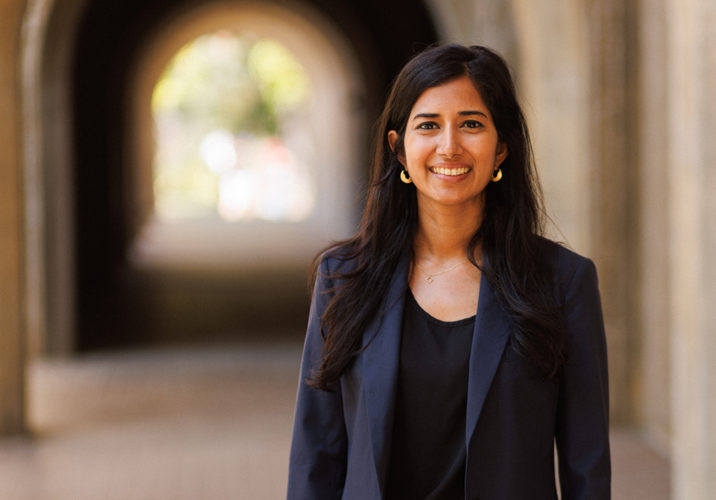Gulika Reddy: Assistant Professor of Law and Director of the International Human Rights and Conflict Resolution Clinic
An Interdisciplinary Approach to Human Rights
In her work around the world, Gulika Reddy has guided law students and community members in their efforts not just to document the effects of conflict and human rights abuses but also to engage in dialogue with stakeholders about how to improve such situations.
Combining peace-building strategies with accountability-based human rights work is a hallmark of Reddy’s approach to legal practice and teaching, an approach she brings to her new role as director of Stanford Law School’s International Human Rights and Conflict Resolution Clinic.

“The human rights field is often great at documenting issues and advocating for change,” explains Reddy, who joined the SLS faculty in July. But resolving conflict requires a more interdisciplinary effort, she adds.
That’s something Reddy learned early in her career as a litigator in India representing individuals who had experienced various forms of identity-based discrimination, including gender-based violence. Her clients often faced obstacles in the very court system in which they were seeking justice; judges sometimes told women who had been raped, for instance, to reach an amicable settlement with or marry their rapist as a form of compromise. Those biases led Reddy to think about how to address and transform root causes of human rights violations in her efforts to effect change.
“I continued to litigate and push for accountability,” she says, “but I also began to think about and work toward prevention.”
In 2014, Reddy founded Schools of Equality, an experiential program that aims to shift attitudes that perpetuate gender-based violence and other forms of identity-based discrimination. The program has been run with children from grade 1 to high school in more than 200 schools in three states in India.
“It’s been inspiring to see not just internal transformation among students but the external, systemic change they have been able to create in their schools and communities,” she says. “Human rights work is incredibly rewarding, but the field faces a range of external and internal challenges. Teaching is a space of hope and possibility.”
Jayashri Srikantiah, associate dean of Clinical Education, professor of law, and director of the Mills Legal Clinic that houses the International Human Rights and Conflict Resolution Clinic, says Reddy is “an exceptional clinician, as reflected in her deep commitment to student growth and ownership, learning by reflection and lawyering in a trauma-informed and culturally humble way.”
“She is also an outstanding human rights lawyer with a broad range of experience with different modalities of advocacy in many different countries and contexts,” Srikantiah adds.
Reddy, who grew up in southern India, was drawn to the law due to the way multiple and overlapping forms of identity—including caste, race, gender, religion, and sexuality—impacted people’s experience in the world.
“As a child, I would question the pervasiveness and normalization of identity-based harms,” she remembers. “And the response was often, ‘This is just how things are.’ I had a desire to challenge the status quo and saw the law as an instrument of change.”
In 2011, Reddy earned her law degree from ILS Law College in Pune, India. After working with lawyers, nonprofits, and academic institutions in India to prevent and respond to identity-based discrimination through litigation, legislative reform, grassroots activism, and public education, she moved to the United States where she earned an LLM from Columbia Law School in 2016 and a master’s in public policy from the Harvard Kennedy School in 2018. Next, she returned to Columbia Law School to teach. Reddy joins Stanford from Columbia where she was the co-executive director of the Human Rights Institute and acting director of the Human Rights Clinic. Reddy has carried out fact-finding investigations, conducted human rights advocacy, and supported peacebuilding efforts around the world, including in Papua New Guinea, Yemen, Kashmir, India, and the Central African Republic.
“Gulika works in some of the most difficult contexts in the world, which demand adaptability, innovation, and interdisciplinary work,” says Anjli Parrin, who worked with Reddy at Columbia and is now at the University of Chicago Law School. “She has an ability to think at the 36,000-foot, bird’s-eye level and then implement something that is really concrete and tangible. She is a spectacular clinical teacher, mentor, advocate, colleague, and institution builder and brings a solution-oriented, creative, and values-based approach to everything she does.”
At Stanford, where the International Human Rights and Conflict Resolution Clinic will be offered again in the spring, Reddy plans to focus on projects that address identity-based discrimination and foster peace in diverse regions around the world using strategies from both the human rights and peacebuilding fields. All the projects are designed and implemented in partnership with impacted communities and civil society groups around the world.
Columbia Law School professor Susan P. Sturm, who taught Reddy as a student and has worked with her on racial and social justice projects, says Reddy “from the outset stood out as a brilliant, committed, and thoughtful activist and intellectual.”
“Gulika is extraordinary in her capacity to blend racial equity and conflict resolution, advocacy and collaboration, global and local change, and incrementalism with transformation,” Sturm says. “Her unwavering commitment to her students is equally matched by her commitment to the communities she serves.”
Reddy says she’s excited to start working with students at Stanford Law.
“I’m grateful to be able to work alongside students and our project partners,” she says. “They make engaging in advocacy and teaching a joy, and their impactful work consistently demonstrates that meaningful change is possible.” SL
Rebecca Beyer is a former staff writer and editor for the Daily Journal.
